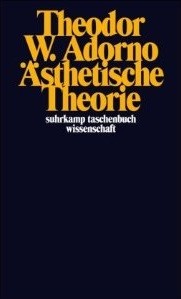Robert Pippin at Nonsite:
 One of Adorno’s most sweeping and frequent characterizations of his project in Aesthetic Theory has it that the “task that confronts aesthetics today” is an “emancipation from absolute idealism.” The context (and the phrase itself) makes it explicit that he means Hegel, but only in so far as Hegel represents the culmination and essence of modern philosophy itself, or what Adorno calls “identity thinking.” He means by this that reflection on art should be freed from an aspiration for any even potential reconciliationist relation with contemporary society, or any sort of role in the potential rationalization or justification of any reform of any basic aspect of late modernity, or freed even from any aspiration for an aesthetic comprehension of that society, as if it had some coherent structure available for comprehension. He especially means that any expression or portrayal of the suffering caused in modern societies—capitalist, bourgeois society—that calls such a society to account in its own terms is excluded. Those terms have become irredeemably degraded and corrupt. Modern bourgeois society is in itself, root and branch, “wrong,” “false,” and the problem of art has become what it must be in such a world. What it must be is “negative,” and any attempt to understand Adorno must begin and end with that claim.
One of Adorno’s most sweeping and frequent characterizations of his project in Aesthetic Theory has it that the “task that confronts aesthetics today” is an “emancipation from absolute idealism.” The context (and the phrase itself) makes it explicit that he means Hegel, but only in so far as Hegel represents the culmination and essence of modern philosophy itself, or what Adorno calls “identity thinking.” He means by this that reflection on art should be freed from an aspiration for any even potential reconciliationist relation with contemporary society, or any sort of role in the potential rationalization or justification of any reform of any basic aspect of late modernity, or freed even from any aspiration for an aesthetic comprehension of that society, as if it had some coherent structure available for comprehension. He especially means that any expression or portrayal of the suffering caused in modern societies—capitalist, bourgeois society—that calls such a society to account in its own terms is excluded. Those terms have become irredeemably degraded and corrupt. Modern bourgeois society is in itself, root and branch, “wrong,” “false,” and the problem of art has become what it must be in such a world. What it must be is “negative,” and any attempt to understand Adorno must begin and end with that claim.
more here.
